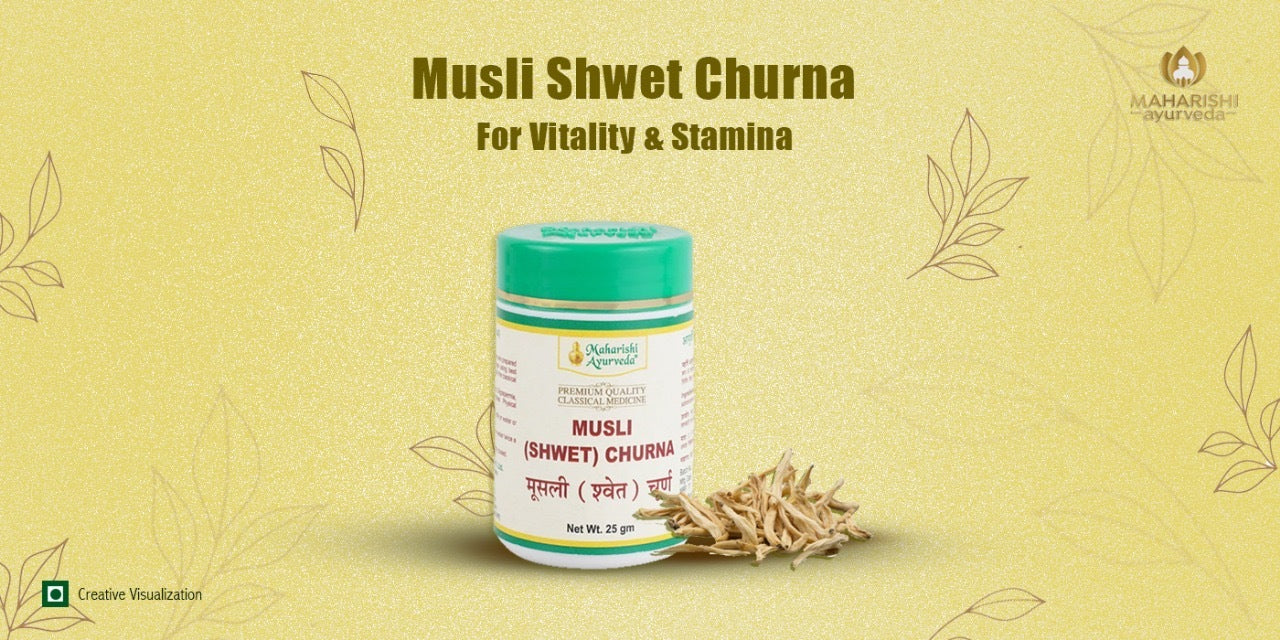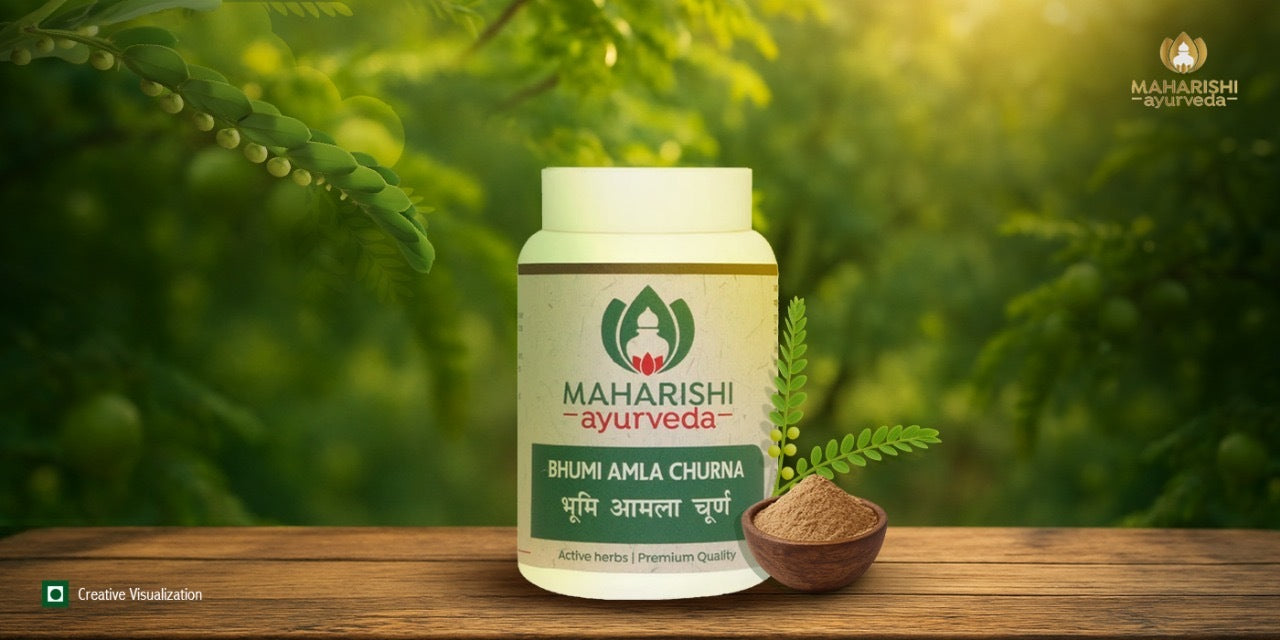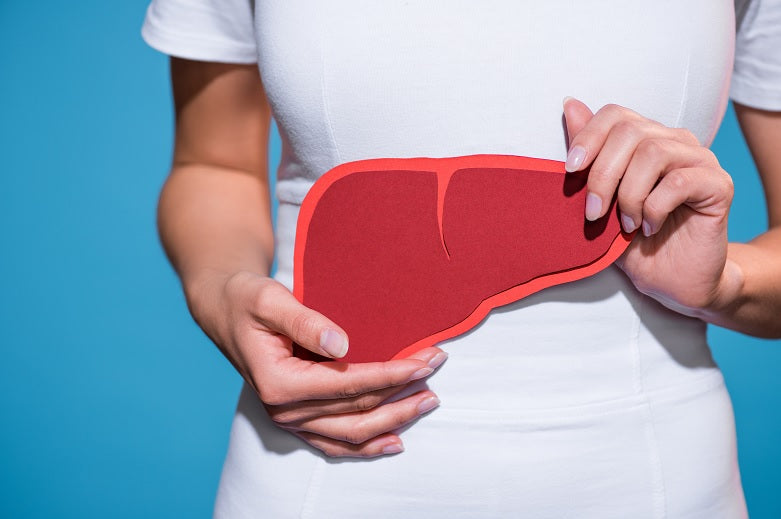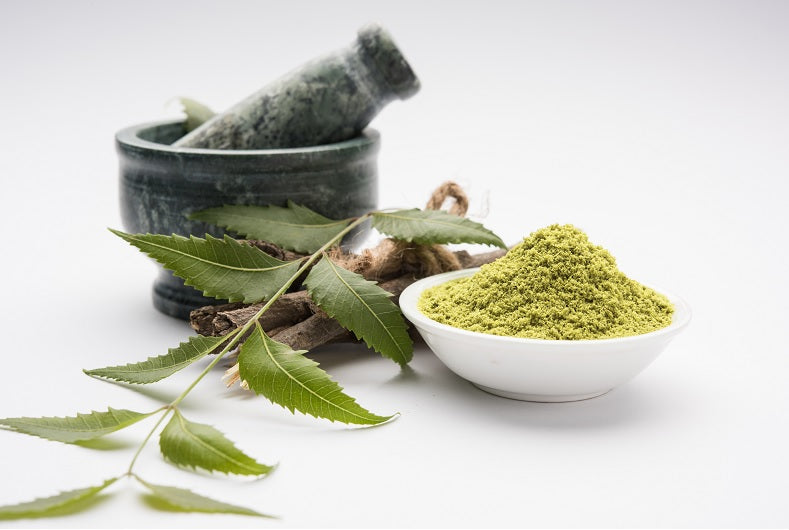
What Are the Benefits of Tulsi? Uses and Side Effects Explained
31 Jul, 2025Tulsi, known scientifically as Ocimum sanctum or Ocimum tenuiflorum, holds a revered place in Ind...
Read more
Tulsi, known scientifically as Ocimum sanctum or Ocimum tenuiflorum, holds a revered place in Indian culture, both spiritually and medicinally. As described in Vedic texts and Ayurvedic scriptures, Tulsi is considered a manifestation of divine energy, revered as an embodiment of Goddess Lakshmi or Vrinda. Traditionally grown in courtyards and offered daily prayers, it is believed to purify the surroundings, uplift the spirit, and balance bodily energies.
In India, Tulsi is not a plant; it's sacred. It's ingrained in everyday life and the ancient Ayurveda system. It's a symbol of purity, devotion, and protection. Many families worship it, offering it water and prayer every day. There's a silent belief that having Tulsi near cleanses the air and the atmosphere, keeping bad vibes away. But this devotion isn't old-school alone. New eyes are slowly opening up to the actual, real health benefits of Tulsi, seeing what Ayurveda has known for centuries: this small pla\nt packs a serious punch for wellness. It's essential. But not all greens are equal.

Just like people, Tulsi comes in different varieties, each with its own character and strengths. Knowing them helps you pick the right one for your needs. The main ones you’ll encounter are sorted by their looks:
Buy Now Tulsi Green Tea Premium with Rama, Krishna & Vana Tulsi for daily detox and balanced energy.
You don’t need a chemistry degree to appreciate Tulsi, but understanding why it works can be helpful. Its power comes from a clever mix of natural compounds:
This synergy of compounds—not commonly found in such high concentration in a single plant—makes Tulsi an unparalleled natural remedy.

Enhances white blood cell function, detoxifies the body, and combats bacterial, viral, and fungal threats. Rich in copper and antioxidants, Tulsi strengthens resilience naturally.
Tulsi pacifies Kapha and Vata, making it ideal for congestion, bronchitis, and asthma. A decoction with black pepper and cinnamon clears nasal blocks and soothes the throat.
With antibacterial and anti-inflammatory properties, Tulsi helps manage acne, fungal infections, and pigmentation. DIY face packs using fresh Tulsi paste promote clearer, radiant skin.
The benefits of Tulsi for skin are well-regarded. Its anti-bacterial and anti-inflammatory properties make it helpful in tackling skin troubles like itching, minor fungal infections, or acne. A simple DIY Tulsi face pack: grind fresh leaves with a bit of water or rosewater into a paste. Apply to clean skin, leave for 10-15 minutes until dry, then rinse with cool water. Regular use can help manage breakouts and pigmentation, partly because Tulsi helps purify the blood.
Modern life is stressful. Tulsi eating benefits include helping your body better handle stress. It’s classified as an adaptogen, meaning it helps normalise your body's stress responses, potentially balancing cortisol levels. A cup of Tulsi tea in the morning or evening can be a simple ritual to foster a calmer mind. In Ayurveda, it’s considered "Sattvic," promoting clarity and positive feelings.
Our bodies are exposed to a significant amount of waste daily – pollution, processed food, and stress. Tulsi benefits include acting as a gentle detoxifier, helping your liver process and eliminate these toxins more effectively. Think of it as giving your internal filtration system a bit of support. This blood-purifying action is a key part of its traditional use.
Supports glucose metabolism, making it a valuable adjuvant in managing Type 2 diabetes. Always consult your physician before regular use.
Feeling bloated or uncomfortable after meals? Tulsi benefits your digestive system. It can help reduce gas, bloating, and indigestion. In Ayurvedic terms, it stimulates digestion (Deepan), helps break down food (Pachan), and eases the movement of wind (Anuloman), reducing that uncomfortable fullness. This also supports a healthier environment for good gut bacteria.
Fancy a natural breath freshener? Chewing one or two fresh Tulsi leaves helps combat the bacteria that cause bad breath and gum issues. Its antimicrobial properties are strong. It’s no surprise you find Tulsi as an ingredient in some Ayurvedic toothpaste – it’s a traditional way to keep gums healthy and teeth cleaner.
Want healthier hair? Tulsi benefits for hair include strengthening the roots and improving blood flow to the scalp. Its antifungal properties also make it helpful in tackling dandruff. Applying a paste of Tulsi leaves to your scalp, or rinsing with Tulsi-infused water after washing, can contribute to a healthier environment for hair growth.
You don't need complicated potions. Tulsi is wonderfully versatile:
Topical Use: A paste of fresh leaves applied to skin irritations, insect bites, or the scalp (for hair benefits) is traditional and practical.
A simple question that might arise in your mind is whether basil is the same as tulsi but in reality, it's not

Though Tulsi is often referred to as ‘Holy Basil’, it differs significantly from the culinary basil (Ocimum basilicum) used in Western kitchens. Tulsi (Ocimum sanctum) is a sattvic herb with high therapeutic value, widely revered in Ayurveda for its ability to balance Vata and Kapha, cleanse the mind, and enhance ojas.
While sweet basil has benefits—especially for digestive ease and menstrual comfort—it lacks Tulsi’s krimighna potency and spiritual significance.
So, while they are cousins, Tulsi stands apart for its specific health focus and cultural importance.
Tulsi is generally very safe for most people in normal food-like amounts (like tea or a few leaves). But it's sensible to know a few precautions:
Still Doubting? Consult: If you have any health conditions or are taking regular medication, it’s wise to chat with an Ayurvedic practitioner or your GP before making Tulsi a major daily supplement. Better safe than sorry.
Let's face it, life gets busy, particularly after 30. Having natural, easy ways to help you feel your best isn't about quick solutions; it's about common-sense habits. Tulsi provides precisely that. We've discussed the best 10 health advantages – from that essential immunity support and making it easier to breathe, to soothing your nerves and supporting your digestion. It's a natural detoxifier, beneficial for your skin and hair, and even helps regulate blood sugar. The elegance of Tulsi is its simplicity. It is surprisingly simple to grow a Tulsi plant at home (it prefers sun and well-draining soil). Keeping it around you grounds you in a little bit of nature and tradition. Pinching off a few leaves to add to your morning tea or simply caring for it becomes a small, quiet ritual. It's a reminder that true wellness often stems from these subtle, daily habits that draw on nature, rather than from pricey supplements or fleeting trends.
So why not give it a shot? Brew up a cup of Tulsi tea tonight. Check to see if that sense of calmness continues. This humble herb is a valuable addition to your daily health toolkit.
Breathe Easy with Nature – Shop Tulsi Tablets Now
Daily use of Tulsi leaves primarily helps support your immune system, aids digestion, promotes a calmer mind, fights common germs, and gently helps your body eliminate toxins. Think of it as a daily wellness tonic.
Yes, eating 1-5 raw Tulsi leaves daily is generally safe and beneficial for most people. Wash them thoroughly first. A standard tip from Ayurveda is to avoid consuming them with milk (like chewing leaves while drinking milk), as this combination is thought to be unhelpful and potentially lead to minor imbalances with long-term use.
Krishna Tulsi (the black or purple variety) is often considered to have a stronger concentration of certain beneficial compounds, particularly Eugenol. This gives it a more potent flavour and is why it's frequently recommended for respiratory issues and strong immune support. While all Tulsi types are beneficial, Krishna Tulsi is generally regarded as the most potent in terms of medicinal benefits.
Tulsi Ark is a concentrated liquid extract made by distilling fresh Tulsi leaves. It captures the essential oils and water-soluble active parts of the plant. It's considered strengthening (a Rasayana), helps balance Vata and Kapha (cold/air and earth/water energies), and gently stimulates Pitta (fire energy). It's used for respiratory troubles, low Immunity, digestion issues, stress, and skin concerns. Use it sparingly: typically 2-10 drops mixed into a small amount of water, once or twice a day. The exact dose depends on your age and health needs – starting low is sensible.
Tulsi, known scientifically as Ocimum sanctum or Ocimum tenuiflorum, holds a revered place in Ind...
Read moreIf you're someone who constantly feels fatigued despite proper rest, finds recovery from physical...
Read moreIntroduction to Bhumi Amla Imagine walking through a quiet forest after fresh monsoon showers,...
Read moreLiver या जिगर मानव शरीर का एक महत्वपूर्ण अंग है जो हमारे शरीर में कई आवश्यक कार्य करता है, जैसे क...
Read moreSummers are fun! But, every year, the heat is getting intense with sweaty days and hot winds. It'...
Read moreCholesterol is a fat-like substance that plays a critical role in building healthy cells in our b...
Read more Guide to Immunity
Guide to Immunity

Tulsi, known scientifically as Ocimum sanctum or Ocimum tenuiflorum, holds a revered place in Ind...
Read more
If you're someone who constantly feels fatigued despite proper rest, finds recovery from physical...
Read more
Introduction to Bhumi Amla Imagine walking through a quiet forest after fresh monsoon showers,...
Read more
Liver या जिगर मानव शरीर का एक महत्वपूर्ण अंग है जो हमारे शरीर में कई आवश्यक कार्य करता है, जैसे क...
Read more Featured Articles
Featured Articles

Are you struggling with your oral health because of your eating habits? Are toothaches becoming your new normal because you have not been brushing well? Is eating ice cream a big NO, as you have brushed a little too much? A lot of you have been made to believe that your oral issues emanate from what you are doing wrong or not doing the right thing. What if we tell you that you have been approaching this all wrong and trying to solve the problems topically instead of addressing the root cause? Do you ever think about the real reason for these significant dental issues?
Ayurveda helps you focus on the fundamentals and identify the root cause. It is the science of treating the underlying imbalances and correcting the cause in a completely natural and effective way. Among its numerous health benefits, when it comes to oral health, Ayurvedic Toothpaste is a game-changer for preserving strong and healthy teeth. A natural and effective alternative to the chemical-laden equivalents and a beneficial synergy of herbs that help in holistic dental care. Surprising, right!? Well, read on to turn your surprise into a new belief!


नित्यमध्मान तां तांस्तु व्याधिभिश्च विवर्जितः।
रसैश्च दन्तमूलानां रूक्षैराचाम्य विक्रियाम्॥
Meaning: Regularly cleaning your mouth makes your teeth and gums healthy and prevents diseases.
The Charaka Samhita mentions the importance of oral care in overall health. This is more than just information from ancient scriptures; much research has validated the role of a healthy mouth in a healthy body. A 2022 study in Frontiers of Microbiology highlighted this critical link: an imbalance in the oral microbiome causes periodontal disease and promotes cardiovascular disease development.
Wondering how? Saliva is the first fluid that is secreted during digestion. It lubricates the tongue and oral cavity and ensures that the whole digestive tract stays lubricated, along with the chewed food passed down to the stomach. It carries all microbes into your gut and is the most crucial link between oral and overall health
Saliva also contains some antimicrobial proteins and enzymes that keep harmful microorganisms from growing while ensuring the good ones thrive. However, any saliva production or composition imbalance can affect the oral microbiota. This could be due to poor oral hygiene, an unhealthy diet, or systemic health issues.
This imbalance can have dire consequences for oral health, such as dental caries, gum issues, and infections. Moreover, balanced saliva helps lubricate and break down food for easy digestion and ensures that teeth get essential minerals to maintain and repair themselves.

Dantadhaawan is an ancient Ayurvedic oral hygiene practice that involves using herbal twigs, AKA ‘‘Datoon’’, to clean teeth and gums. Commonly used twigs include those from the neem, babool, and liquorice plants. These twigs have antimicrobial properties that help maintain oral hygiene.
According to the Shadrasa (six tastes) in Ayurveda, every herb has a Rasa (dominant taste) that determines its properties and actions.
An ideal toothpaste must contain Katu, Tikta, Kashaya, and Madhura Rasa, each of which positively impacts maintaining the health of our oral cavity.
Let’s uncover the properties of these essential Rasas to know more:
|
Rasa |
Action |
|
Katu (Pungent) |
It deeply cleanses the oral cavity |
|
Tikta (Bitter) |
Antibacterial & antiseptic action |
|
Kashaya (Astringent) |
Provides pain relief |
|
Madhura (Sweet) |
Strengthens the gums & teeth |
You see, an Ayurvedic toothpaste not only cleanses your teeth but also gives Bala (strength) through the properties of the natural Dravyas (herbs) used in it.

It may sound complex, but formulating toothpaste at home is as easy as making a face pack! All you need is 10 grams of dry leaves or powders of neem, mulethi, jamun, and amalaki. Grind or mix them, and your dry toothpaste powder is ready! During every brushing session (preferably morning and evening), mix it with your *Dosha-appropriate adjuvants. Vata *Dosha* can mix sesame oil, Pitta *Dosha* can mix ghee, and Kapha *Dosha* can mix honey/mustard oil, and your quick, healthy toothpaste is ready!
If you’re a busy bee, not interested in DIYs, or find it difficult to source these ingredients, don’t worry! We have Maharishi Ayurveda Ayurdent Toothpaste. It is your one-stop solution to all your oral problems. It’s a unique formulation that works on your saliva and is suitable for all body types, irrespective of the Doshic predominance.
It contains neem for cleansing, triphala for balancing, and meswak & ginger for stimulating saliva. Ayurdent promotes holistic oral health naturally and provides protection from major oral problems like cavities, plaque, bleeding gums, toothache, sensitivity, and bad breath. It contains the goodness of 20 Ayurvedic ingredients and is free from SLS and fluoride. Certified by COSMOS Natural, it stands out for its authenticity compared to other Ayurvedic and herbal toothpaste. This innovative, non-foaming formula is a must-try in the category.
 Recent Blogs
Recent Blogs


As per Ayurveda, no two individuals are alike. Maharishi Ayurveda offers personalised treatment for each individual at all touch-points. Consult our expert Vaidyas to get root cause-based personalised treatment from the comfort of your home
CONSULT VAIDYA




